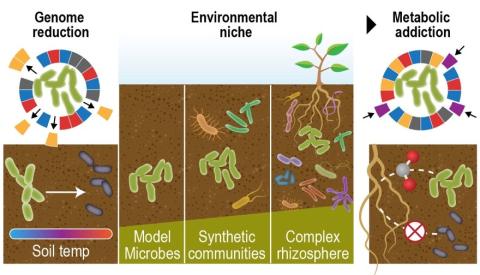"Visualizing the Hidden Half: Plant-Microbe Interactions in the Rhizosphere" Plant roots and the associated rhizosphere constitute a dynamic environment that fosters numerous intra- and interkingdom interactions, including metabolite exchange between plants and soil mediated by root exudates and the...
Filter results
Project Type
Publication Type
Tags
- (-) Machine Learning (4)
- Virology (14)
- Viruses (10)
- Health (8)
- Soil Microbiology (8)
- Virus (8)
- Omics (6)
- Omics-LHV Project (6)
- Differential Expression Analysis (5)
- Gene expression profile data (5)
- Immune Response (5)
- Multi-Omics (5)
- PerCon SFA (5)
- Time Sampled Measurement Datasets (5)
- Autoimmunity (4)
- Biomarkers (4)
- Homo sapiens (4)
- Ions (4)
- Mass Spectrometry (4)
- Mass spectrometry data (4)
- Microbiome (4)
- Molecular Profiling (4)
- Nanoparticles (4)
- sequencing (4)
- Synthetic (4)
- Synthetic Biology (4)
- Type 1 Diabetes (4)
- Fungi (3)
- Genomics (3)
- Spectroscopy (3)
Particle-based crystallization is an important pathway to synthesize advanced materials with complex structures. Unlike monomer-by-monomer addition or Ostwald ripening, particle-based crystallization occurs via particle-by-particle addition to form larger crystals. This chapter reviews the...
Aluminate salts precipitated from caustic alkaline solutions exhibit a correlation between the anionic speciation and the identity of the alkali cation in the precipitate, with the aluminate ions occurring either in monomeric (Al(OH)4–) or dimeric (Al2O(OH)62–) forms. The origin of this correlation...
A major challenge in biotechnology and biomanufacturing is the identification of a set of biomarkers for perturbations and metabolites of interest. Here, we develop a data-driven, transcriptome-wide approach to rank perturbation-inducible genes from time-series RNA sequencing data for the discovery...
Last updated on 2023-02-23T19:37:46+00:00 by LN Anderson PerCon SFA Project Publication Experimental Data Catalog The Persistence Control of Engineered Functions in Complex Soil Microbiomes Project (PerCon SFA) at Pacific Northwest National Laboratory ( PNNL ) is a Genomic Sciences Program...
Datasets
3
The Environmental Determinants of Diabetes in the Young (TEDDY) study is searching for factors influencing the development of type 1 diabetes (T1D) in children. Research has shown that there are certain genes that correlate to higher risk of developing T1D, but not all children with these genes...
Datasets
1
The Diabetes Autoimmunity Study in the Young (DAISY) seeks to find environmental factors that can trigger the development of type 1 diabetes (T1D) in children. DAISY follows children with high-risk of developing T1D based on family history or genetic markers. Genes, diets, infections, and...
Datasets
1
Machine learning is a core technology that is rapidly advancing within type 1 diabetes (T1D) research. Our Human Islet Research Network (HIRN) grant is studying early cellular response initiating β cell stress in T1D through the generation of heterogenous low- and high-throughput molecular...
Datasets
3




